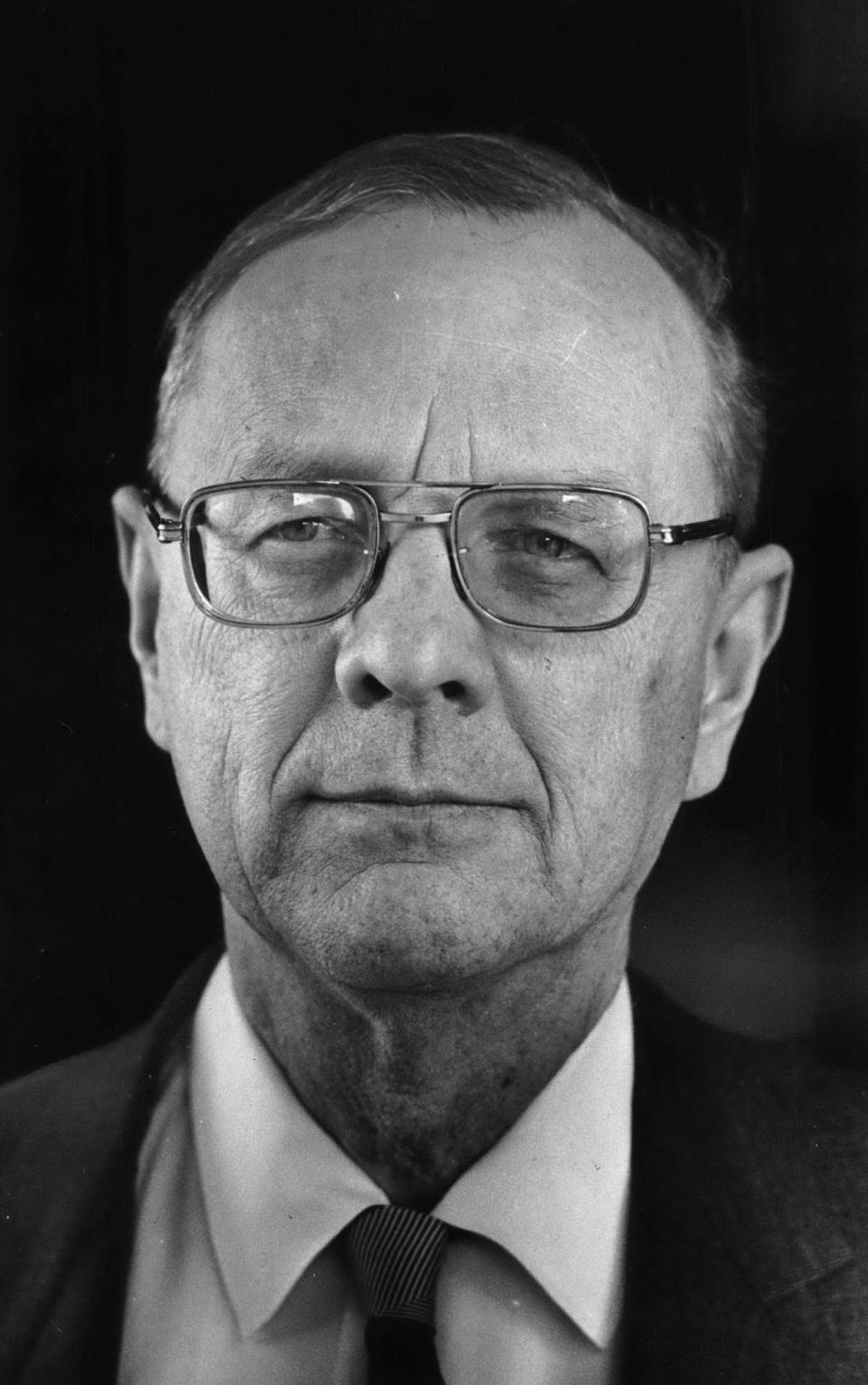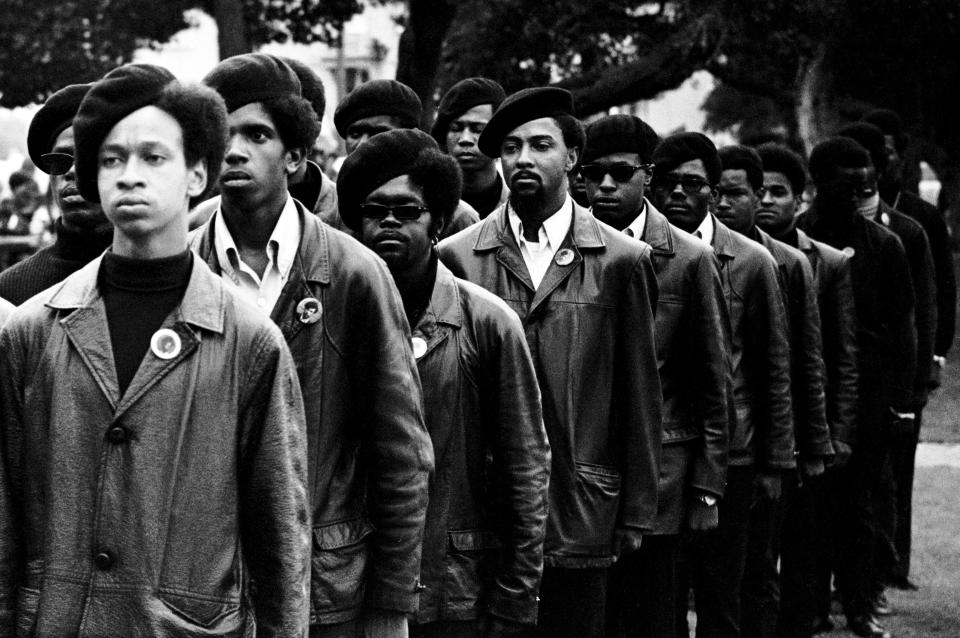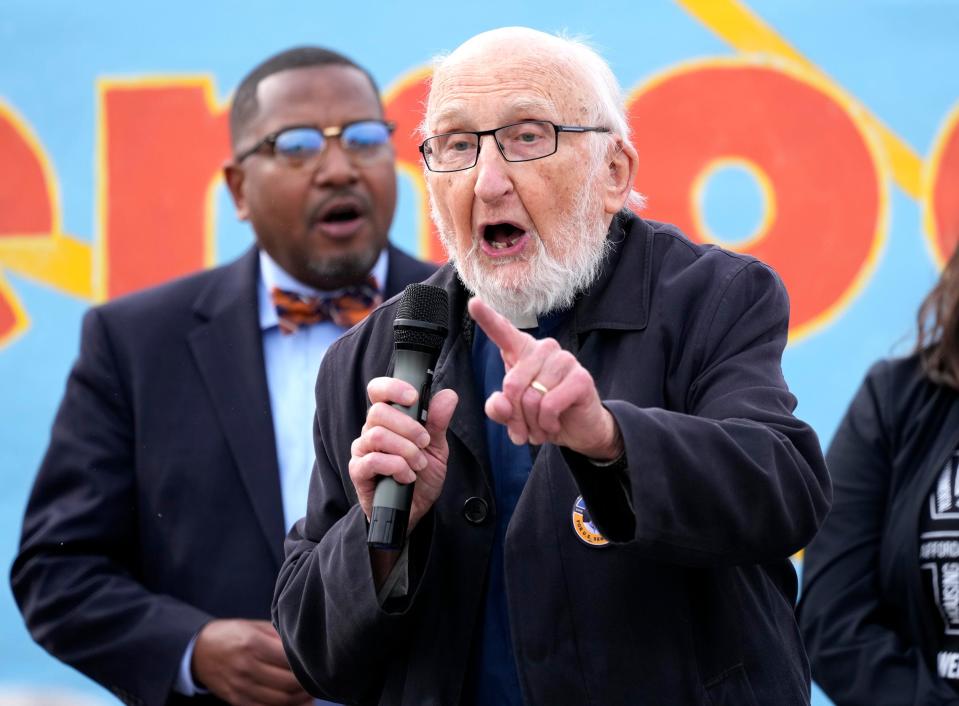The Black Panthers, Joe Ellwanger, and the founding of the Hunger Task Force
When Wisconsinites hear "Hunger Task Force" many think about its anti-hunger operations, but the institution is rooted in the fight for civil rights and its existence was sparked in part by an often-vilified Black power organization, the Black Panthers.
As part of its 50th anniversary, Hunger Task Force is sharing more about its advocacy for free breakfast in Milwaukee schools and how its origins can be tracked back to the Panthers.
At its height, the Black Panther Party for Self-Defense had a breakfast program that fed tens of thousands of children a day across the U.S. In Milwaukee, Joe and Joyce Ellwanger had been running Cross Lutheran Church on the city’s northside, when the Panthers approached them about hosting the program here.
Joe Ellwanger, a former pastor of a predominantly Black church in Birmingham, Alabama, and a leader in the Civil Rights Movement, told the Journal Sentinel that while his church declined the request from the Panthers, it “inspired” the church. It made the congregation recognize a need at Milwaukee Public Schools, which triggered free breakfast at all its schools and ultimately led to the founding of Hunger Task Force.
Ellwanger, 91, sat for an interview with CEO Sherrie Tussler at the sprawling Hunger Task Force facility in West Milwaukee. The nonprofit’s network has grown to 66 food pantries, soup kitchens and homeless shelters in Milwaukee that are visited by more than 21,000 people each month.

“The current facility here is mind-blowing to me because the office, in the beginning, was an upper room in the church with about two or three desks. That was it,” Ellwanger said.
Cross Church approached by Black Panthers
In 1968, an intern pastor told Ellwanger the Panthers wanted him to host the free breakfast program at Cross Church, located at 1821 N. 16th Street. Ellwanger knew a visit from the Panthers wouldn’t be an easy sell to his Lutheran congregation in Milwaukee.
“Our church council had their questions about having the Black Panthers run the program for two reasons,” Ellwanger said. “First of all, they were concerned about the philosophy of the Black Panthers because they did support violence, if necessary. … But also, they were concerned that if we have a breakfast program here at Cross Church, what about all the other children that need the same breakfast program?”
It was that second reason that caught the attention of church leaders and prominent officials.
Ellwanger and the church council organized a group - Citizens for Central City School Breakfast Program - that included former Mayor Frank Zeidler and a registered dietitian at Milwaukee Public Schools, Mary Kelly. The group would advocate for school breakfast programs at schools in the poorest communities in Milwaukee.

Ellwanger said the group took its case to the school board in 1969.
“Oh boy, we were met with all kinds of opposition from a very conservative school board,” Ellwanger said. “They said that breakfast was the responsibility of the families, … not the schools.”
Ellwanger said Kelly and Zeidler were “persistent” and the school board eventually agreed to a pilot program at three MPS schools. The pilot was so successful the board granted breakfast programs at 16 other elementary schools, according to Ellwanger.
Kelly eventually became directly in charge of the MPS breakfast program. “Year after year, she’d get a few more schools and finally had it moved up to middle schools and even the high schools, that surprised me,” Ellwanger said.
Today, MPS offers breakfast at all its schools when the funding is available. Across the state, breakfast programs are met with some opposition, but many school boards and administrations followed suit. According to data from the Wisconsin Department of Public Instruction, just 19% of the state's eligible public and private schools are not offering breakfast.
Hunger Task Force is born
In the early 1970s, after achieving their goal of getting a breakfast program into all MPS schools, the group was asked by the U.S. Department of Agriculture to help get food to low-income families regardless of whether a family member was attending MPS.
Given the directive, the group began widescale distribution of food to children, families, and seniors in poverty. The bulky name "Citizens for Central City School Breakfast Program" no longer encompassed its mission, and soon the group was given a new name during a televised food bank - Hunger Task Force.
The nonprofit now has more than 200 acres of farmland in Franklin that cultivates 70 varieties of 28 different crops. It has a mobile market that travels through Milwaukee County's "food deserts." And it educates students, seniors and families about healthy eating on a budget.
"What we do now is influence how food pantries operate," said Tussler, who retires in June. "And we want to make sure that they have the same core values that we have — compassion, justice, dignity, equity. We want to make sure that people are treated equally, no matter where they go to a food pantry."
Milwaukee Panthers were on the feds radar
Ellwanger, who was a favorite of Dr. Martin Luther King Jr. among white pastors in the South, arrived in Milwaukee in 1967. Born in Selma, he brought with him a storied history and connections to civil rights leaders.
Maybe most notable, Ellwanger helped organize a march for voting rights in Selma on March 6, 1965. When marchers gathered again the next day – March 7, 1965 – state troopers and sheriff’s deputies beat civil rights demonstrators at the Edmund Pettus Bridge. The day is remembered as “Bloody Sunday.”
He said the Panthers made errors in tactics, but one would need to acknowledge the conditions Black people lived in to understand why the group had a militant approach and views that many considered too extreme.
Despite strong and fierce opposition, the Panthers were successful at organizing young, poor, disenfranchised Black people into the party by advocating for major social programs, like free health clinics and free school breakfasts.
The Panthers' national breakfast program took a major hit following the 1969 killing of one of its champions, Fred Hampton, chairman of the Illinois chapter and one of the Panthers' most well-known faces. Hampton and Panther leader Mark Clark were killed in a Chicago police raid of an apartment on Dec. 4, 1969.
FBI records show that the Panthers explored free breakfast in Milwaukee. Not all records on the Milwaukee chapter of the Black Panther Party are public and the FBI maintains about 10,000 pages of the most sensitive records, according to Professor Nik Heynen at the University of Georgia.
Heynen previously worked at the University of Wisconsin-Milwaukee and gave the 2005 Fromkin Lecture on the Black Panther Party in Milwaukee after interviewing former members. He said the original Milwaukee chapter of the Panthers was disbanded after FBI infiltration but it would be tough to put a date on the disbandment.
Ellwanger believes 'people power' can make change
Ellwanger said society still faces many of the problems the Panthers fought decades ago.

“I think we have forces at work that are making it difficult for people to emerge out of poverty or even making it difficult for people to vote, voter suppression is an example of that. Those are negative forces that are constantly at work,” he said.
Ellwanger said he stays grounded in history and his Southern upbringing. “That’s where my roots in Selma come into play,” he said.
He talks about how it seemed hopeless to get voting rights for Black Americans in the 60s and unfortunately, it took a “Bloody Sunday” to wake up the nation and our politicians.

“But that’s the way that change has happened — people power — and it’s probably the basic way in which it will continue to be possible to change,” Ellwanger said.
“And so, we have to just be very vigilant and never say that, well, we’ve accomplished everything. Unfortunately, the struggle goes on.”
Ellwanger said the Panthers were innovators in many ways despite their flaws. He wants to recognize their accomplishments just as Hunger Task Force celebrates its 50th anniversary and the group acknowledges becoming one of the state's most recognizable nonprofits.
"The Black Panthers really were thinking ahead, and they were on target in terms of the need for children going to school to have something in their tummy," he said. "And so it was an important beginning."
Drake Bentley can be reached at DBentley1@gannett.com.
This article originally appeared on Milwaukee Journal Sentinel: Hunger Task Force has roots nurtured by the Black Panther Party

